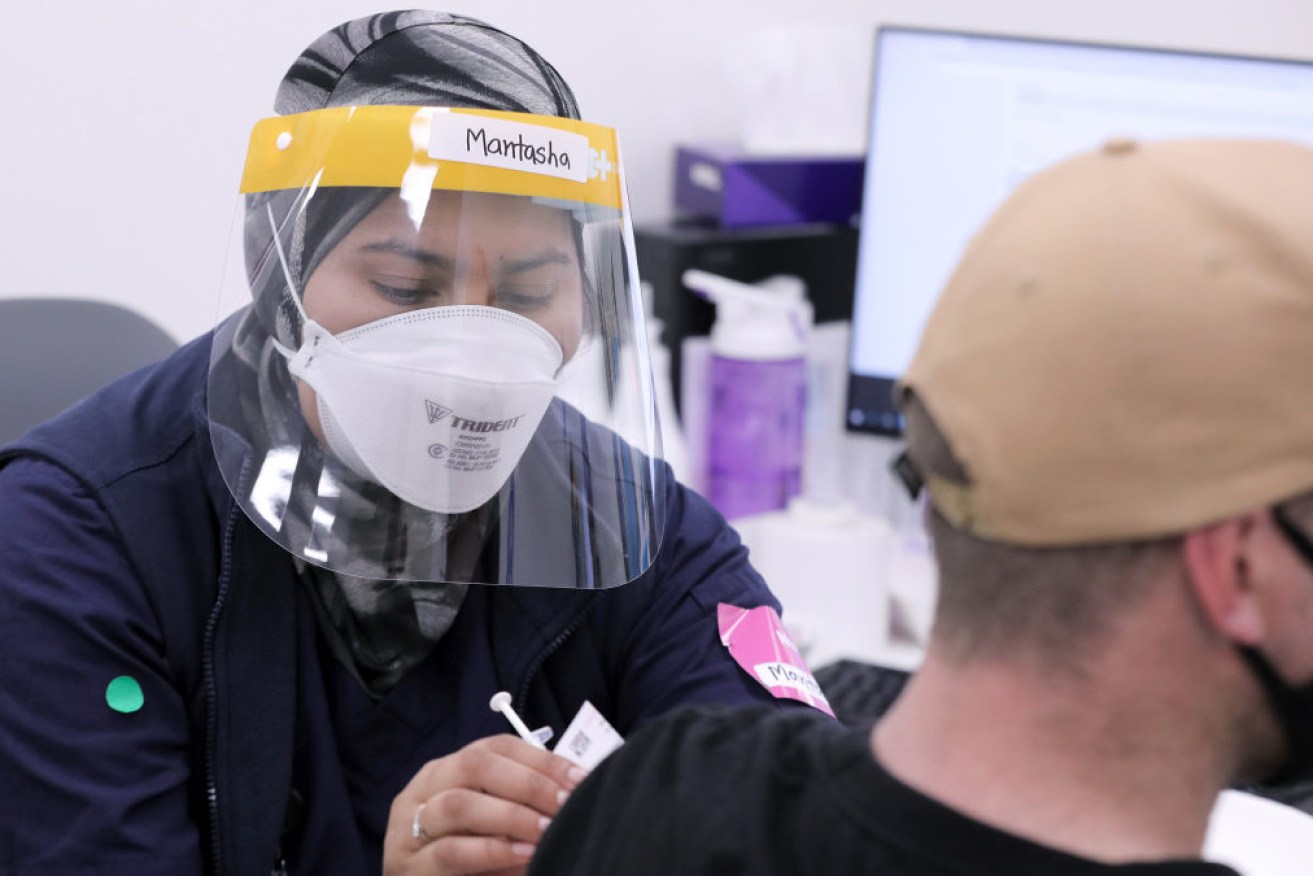COVID: AstraZeneca booster approved for adults


Pfizer and Moderna remain the preferred booster option. Photo: AAP
The Therapeutic Goods Administration has provisionally approved an AstraZeneca booster for adults.
But the health department stresses Pfizer and Moderna remain the preferred booster options, regardless of what vaccines someone has previously received.
“The decision to receive Vaxzevria (AstraZeneca) as a booster must be made in consultation with a medical professional,” the department said.
Updates on the efficacy of boosters and Australia’s vaccine rollout will be canvassed by Prime Minister Scott Morrison, premiers and chief ministers at Thursday’s national cabinet meeting.
It has been brought forward a day so Mr Morrison can meet foreign ministers from so-called Quad countries the US, Japan and India on Friday.
The apparent easing of daily Omicron infection tallies and capacity of the health system will be on the national cabinet agenda, along with guidelines to ensure consistent access to virus-hit aged care homes in different jurisdictions.
Australia reported a combined 70 virus deaths across states and territories on Wednesday.
Twenty-four people died in Queensland, with the state also recording 6902 new daily infections.
NSW and Victoria reported a combined 41 deaths, and 10,312 and 9908 infections respectively.
South Australia and Tasmania had two deaths each, with the former notching up 1671 infections and the latter 574.
The ACT reported 475 cases as well as one death, the Northern Territory 1128 infections and Western Australia 94.
Now let’s take a look at the COVID situation around the world.
WHO says cases have dropped
The World Health Organisation says coronavirus case counts fell 17 per cent worldwide in the past week from the previous seven days, including a 50 per cent drop in the US, while deaths globally declined 7 per cent.
But WHO chief Tedros Adhanom Ghebreyesus cautioned that “diseases know no borders” and the Omicron variant had shown that “any feeling of safety can change in a moment”.
“Depending on where you live, it might feel like the COVID-19 pandemic is almost over, or, it might feel like it is at its worst,” Dr Tedros said.
“But wherever you live, COVID isn’t finished with us.”
“We know this virus will continue to evolve, but we are not defenceless,” he added.
“We have the tools to prevent this disease, test for it and to treat it.”
The WHO’s weekly epidemiological report shows that the Omicron variant is increasingly dominant – making up nearly 97 per cent of all cases tallied by the international virus-tracking platform known as GISAID.
The remainder were all Delta.
“The prevalence of the Omicron variant has increased globally and is now detected in almost all countries,” WHO said.
“However, many of the countries which reported an early rise in the number of cases due to the Omicron variant have now reported a decline in the total number of new cases since the beginning of January 2022.”
Tweet from @WHO
WHO reported more than 19 million cases of COVID and fewer than 68,000 deaths in the week from January 31-February 6. As with all such tallies, experts say such figures are believed to greatly underestimate the real toll.
Case counts fell in each of WHO’s six regions except its eastern Mediterranean zone. It reported a 36 per cent jump, notably with increases in Afghanistan, Iran and Jordan.
In Europe, case counts fell 7 per cent – led by declines in places such as France and Germany – even as countries in eastern Europe such as Azerbaijan, Belarus and Russia posted increases.
In the Americas, case counts fell 36 per cent, with the US –still the single most-affected country – reporting 1.87 million cases, down 50 per cent from the previous week.
WHO cited limited data about the effectiveness of vaccines against the Omicron variant. It said estimates showed reduced protection of the first series of COVID-19 vaccines against the variant for severe disease, symptomatic disease and infection.
Vaccines were most effective to prevent severe disease from Omicron.
The agency said booster doses increased estimates of vaccine effectiveness to more than 75 per cent for all vaccines for which data was available. Rates declined three to six months after injection.
Restrictions ease overseas
Authorities in Sweden, Poland, Britain and the United Arab Emirates have announced an easing in coronavirus restrictions as the global number of infections since the start of the pandemic surpassed 400 million.
Sweden scrapped almost all of its few restrictions on Wednesday and stopped most testing for COVID.
Sweden’s government announced last week it would scrap the remaining restrictions – effectively declaring the pandemic over – as vaccines and the less severe Omicron variant have cushioned severe cases and deaths.
“As we know this pandemic, I would say it’s over,” Minister of Health Lena Hallengren told Dagens Nyheter.
“It’s not over, but as we know it in terms of quick changes and restrictions it is,” she said, adding that COVID would no longer be classified as a “danger to society.”
As of Wednesday, Swedish bars and restaurants will be allowed to stay open after 11pm again, with no limits on patron numbers.
The country has halted wide-scale testing for COVID even among people showing symptoms of an infection. That has put an end to mobile city-square tent sites, drive-in swab centres and home-delivered tests that became ubiquitous during the pandemic and provided essential data for tracking its spread.
The move puts Sweden at odds with most of Europe. But some experts say it could become the norm as costly testing yields fewer benefits with the easily transmissible but milder Omicron variant and as governments begin to consider treating COVID-19 as they do other endemic illnesses.
“We have reached a point where the cost and relevance of the testing is no longer justifiable,” Swedish Public Health Agency chief Karin Tegmark Wisell said this week.
“If we were to have extensive testing adapted to everyone who has COVID-19, that would mean half a billion kronor a week (about $A77 million) and 2 billion a month.”
From Wednesday (local time), only health care and elderly care workers and the most vulnerable will be entitled to free PCR testing if they are symptomatic. The rest of the population will simply be asked to stay home if they show symptoms that could be COVID-19.
Antigen tests are readily available to buy in supermarkets and pharmacies. But those results are not reported to health authorities.
In Britain, instead of dropping all testing requirements, authorities are relying on testing in addition to vaccination to help enable people to return to normal life.
The government has also made rapid tests freely available and encouraged people to test themselves before potentially risky gatherings, hoping that knowing their status will curb COVID-19 transmission.
On Wednesday, Prime Minister Boris Johnson signalled his intention to remove at the end of February the need to isolate after a positive COVID-19 test.
People would still be advised to self-isolate.
The UAE will gradually lift restrictions as the number of infections and hospitalisations has fallen, the state news agency WAM reported on Wednesday.
Venues will be allowed to function at maximum capacity by mid-February, it said.
The oil-rich federation has one of the world’s highest vaccination rates.
Meanwhile, the Polish health minister said on Wednesday that an end to the COVID-19 pandemic was in sight as he announced a cut to the isolation period for infected people and looser quarantine rules.
Poland registered record daily case numbers as recently as two weeks ago but with infections falling and the effects of Omicron appearing milder than previous variants, authorities believe the time is right for a lighter touch.
“We are dealing with the beginning of the end of the pandemic,” Adam Niedzielski said.
“In February, declines in infections should be relatively large.”
In comments published earlier on Wednesday, Mr Niedzielski said Poland might lift its COVID-19 restrictions in March if daily infection numbers kept falling at the current rate.
-with AAP








